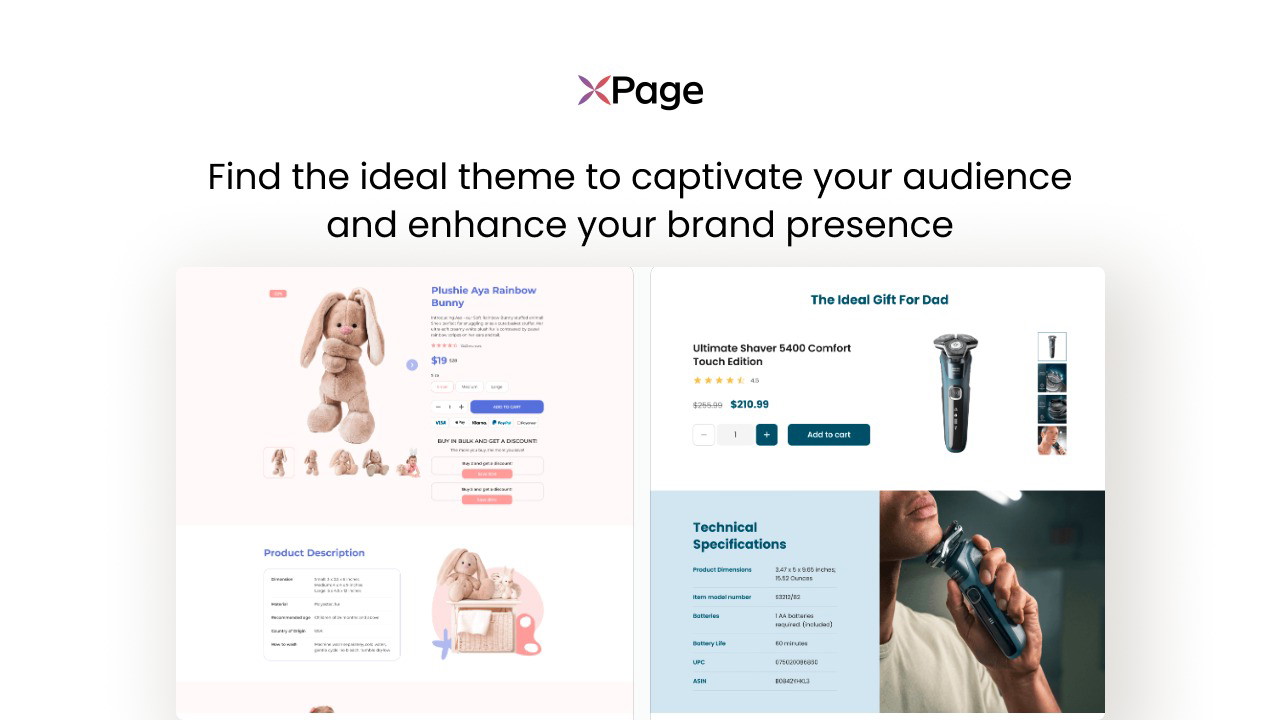xPage: Complete Buyer's Guide
Shopify-native AI landing page solution
xPage is a Shopify-native AI landing page solution that automates product page generation for ecommerce businesses through one-click import functionality and template-based optimization.
Market Position & Maturity
Market Standing
xPage operates as a specialized niche player within the AI landing page market rather than a comprehensive platform competitor. While this focus enables deeper Shopify integration, it also limits addressable market and creates dependency risks that broader platforms avoid[120][123].
Company Maturity
Market engagement indicators reveal concerning maturity signals. Product Hunt displays 0 reviews despite 9 followers, indicating limited market engagement and customer validation[127].
Growth Trajectory
Growth trajectory indicators include AppSumo offering lifetime access at $59-$199 through limited-time deals[120][132], which may suggest either growth marketing strategy or revenue pressure.
Strategic Partnerships
The platform's strategic partnerships appear limited to Shopify ecosystem integration, without evidence of broader enterprise relationships or ecosystem positioning that would indicate market maturity.
Longevity Assessment
Longevity assessment requires careful consideration of platform dependency risks and limited market validation. Organizations must evaluate long-term Shopify commitment and assess switching costs should business requirements change[120][131].
Proof of Capabilities
Customer Evidence
Customer evidence remains primarily limited to vendor claims without independent verification of performance metrics or transformation outcomes[118][119][123].
Quantified Outcomes
Quantified outcomes are largely absent from available research sources. Vendor assertions of "increased conversions" lack quantified benchmarks or comparative analysis against alternatives[118][119][123].
Market Validation
Market validation indicators show mixed signals. While the platform targets specific use cases like dropshipping operations importing AliExpress products[119][122][124] and flash sales needing immediate landing page deployment[127][133], documented customer adoption metrics, retention rates, and growth indicators are not publicly available.
Competitive Wins
Competitive validation suggests xPage serves a specific market niche effectively while creating significant limitations for broader applications.
AI Technology
xPage's AI capabilities center on automated layout optimization and dynamic content adaptation through machine learning algorithms, though technical specifics remain undisclosed in public documentation[119][123].
Architecture
Architecture constraints include platform dependency requirements, with organizations needing to maintain Shopify subscriptions to utilize xPage functionality, creating dual vendor relationships and potential coordination challenges[120][123].
Primary Competitors
Primary competitors include Leadpages, Webflow, and ClickFunnels[131].
Competitive Advantages
Competitive advantages center on Shopify ecosystem integration and one-click import functionality that represents a significant advantage for Shopify-based operations compared to multi-platform solutions requiring manual data entry[120][123][133].
Market Positioning
Market positioning reveals xPage as a specialized solution rather than a comprehensive platform competitor. While this focus enables deeper Shopify integration, it also limits addressable market and creates dependency risks that broader platforms avoid[120][123].
Win/Loss Scenarios
Win/loss scenarios favor xPage for Shopify-based businesses requiring rapid product page generation, particularly dropshipping operations and flash sales[119][122][124][127][133]. Alternative solutions become preferable for organizations requiring multi-platform deployment, advanced personalization capabilities, or complex design customization[120][131].
Key Features

Pros & Cons
Use Cases
Integrations
Pricing
Featured In Articles
Comprehensive analysis of Landing Pages for Ecommerce for Ecommerce businesses and online retailers. Expert evaluation of features, pricing, and implementation.
How We Researched This Guide
About This Guide: This comprehensive analysis is based on extensive competitive intelligence and real-world implementation data from leading AI vendors. StayModern updates this guide quarterly to reflect market developments and vendor performance changes.
135+ verified sources per analysis including official documentation, customer reviews, analyst reports, and industry publications.
- • Vendor documentation & whitepapers
- • Customer testimonials & case studies
- • Third-party analyst assessments
- • Industry benchmarking reports
Standardized assessment framework across 8 key dimensions for objective comparison.
- • Technology capabilities & architecture
- • Market position & customer evidence
- • Implementation experience & support
- • Pricing value & competitive position
Research is refreshed every 90 days to capture market changes and new vendor capabilities.
- • New product releases & features
- • Market positioning changes
- • Customer feedback integration
- • Competitive landscape shifts
Every claim is source-linked with direct citations to original materials for verification.
- • Clickable citation links
- • Original source attribution
- • Date stamps for currency
- • Quality score validation
Analysis follows systematic research protocols with consistent evaluation frameworks.
- • Standardized assessment criteria
- • Multi-source verification process
- • Consistent evaluation methodology
- • Quality assurance protocols
Buyer-focused analysis with transparent methodology and factual accuracy commitment.
- • Objective comparative analysis
- • Transparent research methodology
- • Factual accuracy commitment
- • Continuous quality improvement
Quality Commitment: If you find any inaccuracies in our analysis on this page, please contact us at research@staymodern.ai. We're committed to maintaining the highest standards of research integrity and will investigate and correct any issues promptly.